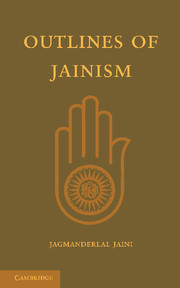Book contents
- Frontmatter
- DEDICATED
- TABLE OF CONTENTS
- PRELIMINARY NOTE
- PREFACE
- BIBLIOGRAPHICAL NOTE
- INTRODUCTION AND HISTORY
- OUTLINES
- TEXTS
- APPENDICES
- APPENDIX I Jain Logic
- APPENDIX II Cosmogony, Cosmology, Astronomy
- APPENDIX III Sixty-three Great Persons, etc.
- APPENDIX IV 143 Qualities, etc., of Saintly Souls
- APPENDIX V The Ancient Jaina Sacred Literature
- INDEX
APPENDIX I - Jain Logic
from APPENDICES
Published online by Cambridge University Press: 05 June 2016
- Frontmatter
- DEDICATED
- TABLE OF CONTENTS
- PRELIMINARY NOTE
- PREFACE
- BIBLIOGRAPHICAL NOTE
- INTRODUCTION AND HISTORY
- OUTLINES
- TEXTS
- APPENDICES
- APPENDIX I Jain Logic
- APPENDIX II Cosmogony, Cosmology, Astronomy
- APPENDIX III Sixty-three Great Persons, etc.
- APPENDIX IV 143 Qualities, etc., of Saintly Souls
- APPENDIX V The Ancient Jaina Sacred Literature
- INDEX
Summary
Western logic is material or formal and inductive or deductive. Its chief topics are the term, the proposition, and the syllogism. Its aim is consistency in argument—formal truth mostly.
Jaina logic has for its aim to remove ignorance; to acquire knowledge ; to know what is harmful, what is beneficial and to be adopted, and to what it is fit to be indifferent. The whole of Jainism follows the maxim : Do not live to know, but know to live. Logic is not mental training merely; it is a necessary help in ascertaining the truth, as we move along.
How to achieve this aim? By proving things through {tramcbui.
What is pramdnu? It is that by which is established the knowledge of the self and of that which was not known before.
It also means the way of knowing a thing without doubt, perversion, and indifference ; e.g. I know a jar by myself. Conviction in this proves existence of the self and the jar both. [Compare the conclusion of Descartes: Cogito, ergo sum.]
Besides (i)pramdnas we have (ii)nay as and (iii)sydd-vdda.
Pramdnas are of two kinds : pratyaksha and jyirolcsha.
It is of two kinds: sdmvyavahdrika-pratyaksha, or the way of knowing things by means of the five senses and the mind; pdramdrthika-pratyaksha,the way of knowing things by the soul itself through removal of all karmic matter that obscures its knowledge.
This is of five kinds :
1. smriti, remembrance ;
2. pratyabhijndna, memory by sight, i.e. recognition;
3. tarka, argument from association; e.g. birth and pregnancy ; smoke and fire; rain and wet pavement; dawn and lotus-blossoming;
4. anumdna, inference; this is of two kinds :
(1)upalabdhi, establishing an affirmative or negative proposition by a positive middle.
anupalabdhi, establishing an affirmative or negative proposition by a negative middle.
5. dgama, sabda, knowledge from what the Teacher has said.
- Type
- Chapter
- Information
- Outlines of Jainism , pp. 112 - 118Publisher: Cambridge University PressPrint publication year: 2013
- 1
- Cited by



